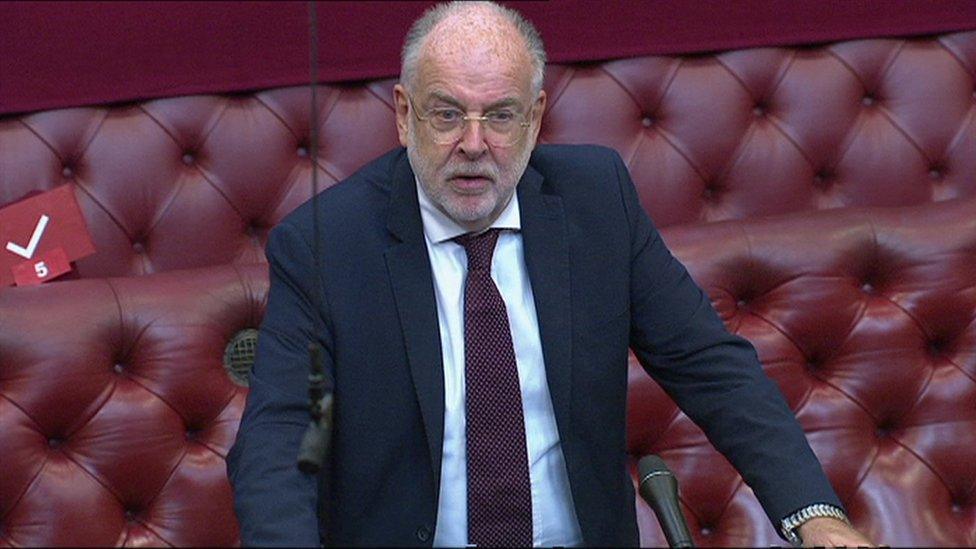Brexit: Lords' anger over 'hypocritical' changes to divorce deal
- Published
Lord Howard said the bill would damage the UK's reputation
A government bill which overrides key parts of the Brexit divorce deal has been strongly criticised in the House of Lords.
Labour peer Lord Falconer said the bill's "stinking hypocrisy" would make it harder for the UK to hold foreign dictators to account.
Former Tory leader Lord Howard said the bill would damage the UK's reputation as a protector of the rule of law.
But a government justice spokesman said it was needed in case trade talks fail.
Lord Keen, who is also Advocate General for Scotland, said it was "not unprecedented" for UK legislation to "cut across" international obligations.
He added the bill would give ministers powers to ensure a legal void does not ensue if talks with the EU over the future of the Irish border break down.
The latest round of trade talks - between EU negotiator Michel Barnier and UK representative Lord David Frost - wrapped up on Thursday, amid rising pressure to get a deal.
But the UK Internal Market Bill has sent shockwaves through the process, with the European Commission saying it would constitute an "extremely serious violation" of the withdrawal agreement.
On Thursday, the Brussels-based body called on UK to change the bill by the end of the month to "re-establish" trust in the negotiations.
It followed a two-hour meeting between Cabinet Office Minister Michael Gove with the Commission's Vice-President Maros Sefcovic to explain the UK's actions.
The bill, published on Wednesday, external, will require the approval of the House of Lords as well as MPs before it can become law.
It addresses the Northern Ireland Protocol - an element of the withdrawal agreement designed to prevent a hard border returning to the island of Ireland.
Under the terms of the withdrawal agreement signed by Prime Minister Boris Johnson in January, the UK must resolve differences over border arrangements with the EU through a special joint committee.
But the new bill would give UK ministers the power to modify or "disapply" rules relating to the movement of goods due to apply in Northern Ireland from 1 January.
The government has accepted the bill breaches the withdrawal agreement, but says the powers are required to ensure that trade across England, Wales, Scotland and Northern Ireland - the UK internal market - is protected in all circumstances.
'Stinking hypocrisy'
During an urgent debate on the bill, former Lord Chancellor Lord Falconer said the government's acceptance of the breach would be "thrown in the UK's face for years".

Lord Falconer served as justice secretary under former Labour PM Tony Blair.
The Labour peer, also the party's shadow attorney general, said dictators around the world could use it to "justify murderous breaches of international law".
"This stinking hypocrisy chokes our country's reputation and destroys our government's ability to lead at home and make agreements abroad," he said.
He added that he was "surprised" Lord Keen had not resigned from his government role in protest. The government's chief law officer, Sir Jonathan Jones, resigned on Tuesday over concerns about the bill.
Lord Howard, who was Conservative leader between 2003 and 2005, said the bill would damage the UK's "reputation for probity and respect for the rule of law".
He said Northern Ireland Secretary Brandon Lewis's admission that it would breach international law were "words which I never thought I would hear uttered by a British minister - far less a Conservative minister".
He asked: "How can we reproach Russia or China or Iran when their conduct falls below internationally accepted standards when we are showing such scant regard for our treaty obligations?"
'Impossible to defend'
Speaking on Radio 4's PM programme after the debate, former Conservative chancellor Lord Lamont said ministers would have to "think again" over the bill.
The Brexit-backing peer added: "I don't think it's going to get through the Lords in its present form".
He said the admission it would breach international law was "impossible to defend" and the government was in "a terrible mess" over the issue.
A growing number of Conservative MPs have also criticised the bill, which is due to begin detailed scrutiny in the House of Commons next week.
Senior backbencher Sir Roger Gale said he would vote against the bill if it is presented "in its present form", and predicted "a lot of others" would do the same.
He told BBC News: "The right thing is to stand by the withdrawal agreement that we entered into and signed and passed through Parliament."
Defending the bill during the debate, Lord Keen said "very real tensions" between UK and international laws can occur "from time to time".
He added that ultimately it would be for Parliament to decide whether it is "appropriate" for ministers to get the new powers offered to them in the bill.
If it is eventually approved by MPs, it will then be sent for a vote in the Lords at a later date.
- Published8 September 2020
